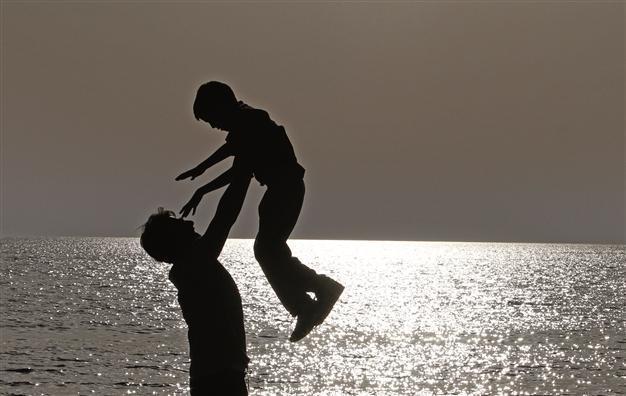Swedish dads stay home so mum can get back to work
ANKARA - Hürriyet Daily News

A father plays with his son on a beach facing the Adriatic sea. Seeing fathers taking care of their children in public places does not surprize anyone in Sweden.
Numerous sociological studies have shown that Swedish fathers are more involved in raising their children and domestic chores than fathers in other countries.At the Humlegaarden park in central Stockholm, Anders Weide keeps an eye on his young daughter Alma sleeping in her pram as he waits for a friend who’s gone to change his son’s diaper. In Sweden, the image surprises no one. “It’s very important to see fathers walking in town with prams, it sets an example,” explains Malmoe University sociologist Lars Plantin, who specializes in parenting issues.
They frequently drop off and pick up their children at school and accompany them to after-school activities. They take days off work to care for their sick kids, they put band-aids on scrapes and cook meals: Swedish fathers are now expected to share the tasks that once belonged solely to mothers.
Fathers’ magazine: ‘Pappa’
In a sign of the times, a monthly magazine called “Pappa” has been published since 2011, targeting “the man who aims to invest time in his children, his relationships and his career.” Even at the highest levels of business and politics, fathers are involved in family life and the home.Prime Minister Fredrik Reinfeldt has often spoken of his passion for hovering and cleaning. While he and his ex-wife Filippa may now be divorced with three children, when they were married she was able to climb the ladder of her own political career while he ran the country’s affairs.
Since 1976, couples who separate or divorce in Sweden are by default awarded joint custody, with many children spending one week with mum and one week with dad. “The prevailing thinking is that the child does best when he or she has good relationships with both parents, which encourages the idea of joint custody,” says Anna Singer, a professor of civil law at Uppsala University.
“The system encourages fathers to take their responsibilities, it has encouraged people,” she adds. Sweden’s long tradition of gender equality naturally plays a role. “Gender equality is a prerequisite for Sweden to progress. It’s not a purely ideological issue, it’s an economic one also,” Plantin says.
Sweden “can’t afford to have half its population excluded from the job market. It’s not about leaving the men at home, but getting women to work more,” he explains. Official figures from Eurostat show that 77.2 percent of women in Sweden held down a job in 2011, the highest level in the EU. Children are guaranteed a spot in daycare as of the age of 12 months for a very modest sum, making it possible for women to return to work.
Yet Sweden still has a way to go in terms of equality in the workplace. While 82 percent of children have two working parents, only 42 percent of women work full-time compared to 74 percent of men, according to Statistics Sweden. And when it comes to what is considered the symbol of gender equality, Sweden’s generous 16-month parental leave that can be taken by either mothers or fathers, women still take the majority of it, claiming 75 percent.
When it was introduced in 1974, mothers took 99.5 percent of it. When one month was reserved for fathers in 1995 under a “use it or lose it” system, fathers slowly began staying home with their children. In 2002, a second month was reserved for fathers, and they have no excuse not to take it: parental leave can be used anytime up until the child turns eight years old. “We’re heading in the right direction, but it’s going too slowly,” says Ulrika Haggstroem, analyst at the TCO white collar workers’ union. She thinks at least three months should be reserved for dads.
















